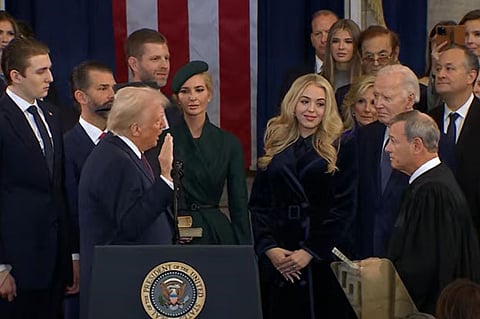Supreme Court Halts Trump Deportation of Venezuelans
The U.S. Supreme Court on Saturday ordered a temporary halt to the Trump administration’s deportation of Venezuelan migrants from Texas under a rarely used 1798 law, just as some detainees were reportedly being transported for removal.
The unsigned ruling directed the government not to remove any members of the detained group “until further order of this Court.” Conservative Justices Clarence Thomas and Samuel Alito dissented.
The decision came after the American Civil Liberties Union (ACLU) filed emergency petitions on Friday, warning that Venezuelans held at the Bluebonnet Detention Center near Abilene, Texas, had been told they would be deported imminently under the Alien Enemies Act (AEA).
Legal Challenges and Due Process
Last month, President Donald Trump invoked the AEA—a law historically applied only during wartime—to justify deporting Venezuelans he accused of being members of the Tren de Aragua gang and “perpetrating an invasion.” The administration had already deported some alleged gang members under the law in March, despite a federal judge’s order to pause the removals.
Though the Supreme Court lifted that block on April 7, it ruled that individuals facing deportation under the AEA must be given an opportunity to legally challenge their removal. Saturday’s order ensures the detainees can now exercise that right.
The ACLU’s lawsuit argued that the Venezuelans had received deportation notices only in English—despite some not understanding the language—and were not informed of their right to contest the decision in court. “Without this Court’s intervention, dozens or hundreds of proposed class members may be removed to a possible life sentence in El Salvador with no real opportunity to contest their designation or removal,” the filing stated.
Trump Defends Executive Authority
When questioned about the deportations on Friday, Trump said he was unaware of the specific case but asserted his authority to remove “bad people.”
“That’s why I was elected. A judge wasn’t elected,” he told reporters at the White House.
The administration has maintained that its executive powers grant broad discretion in enforcing immigration laws, a stance that risks clashing with constitutional checks on presidential authority. Legal experts warn that continued defiance of court orders could escalate into a constitutional crisis.
Historical Precedent and Controversial Deportations
The AEA, last invoked during World War II to justify Japanese internment, has been used only three times in U.S. history. As of April 8, 137 of the 261 Venezuelans deported to El Salvador—where some were held in a high-security prison—were removed under the law, according to a senior administration official.
In a separate high-profile case, the government admitted to mistakenly deporting Salvadoran national Kilmar Ábrego García, whom it alleges is an MS-13 gang member—a claim he and his family deny. Though the Supreme Court unanimously ruled he should be allowed to return, the administration has refused, stating he will “never” re-enter the U.S.
The legal battle underscores the ongoing tension between the White House and judicial branch over immigration enforcement, with advocates warning of eroded due process protections.

